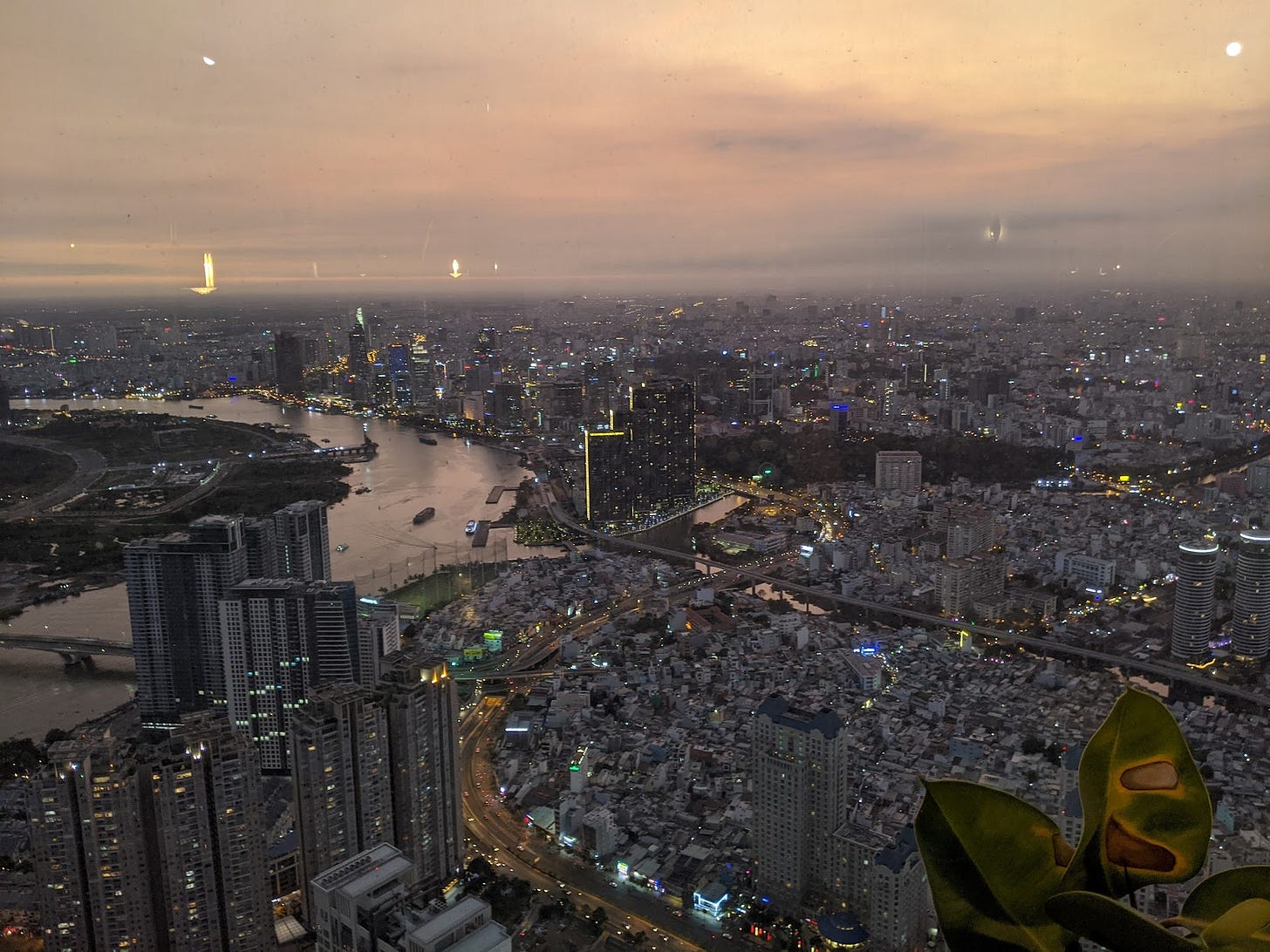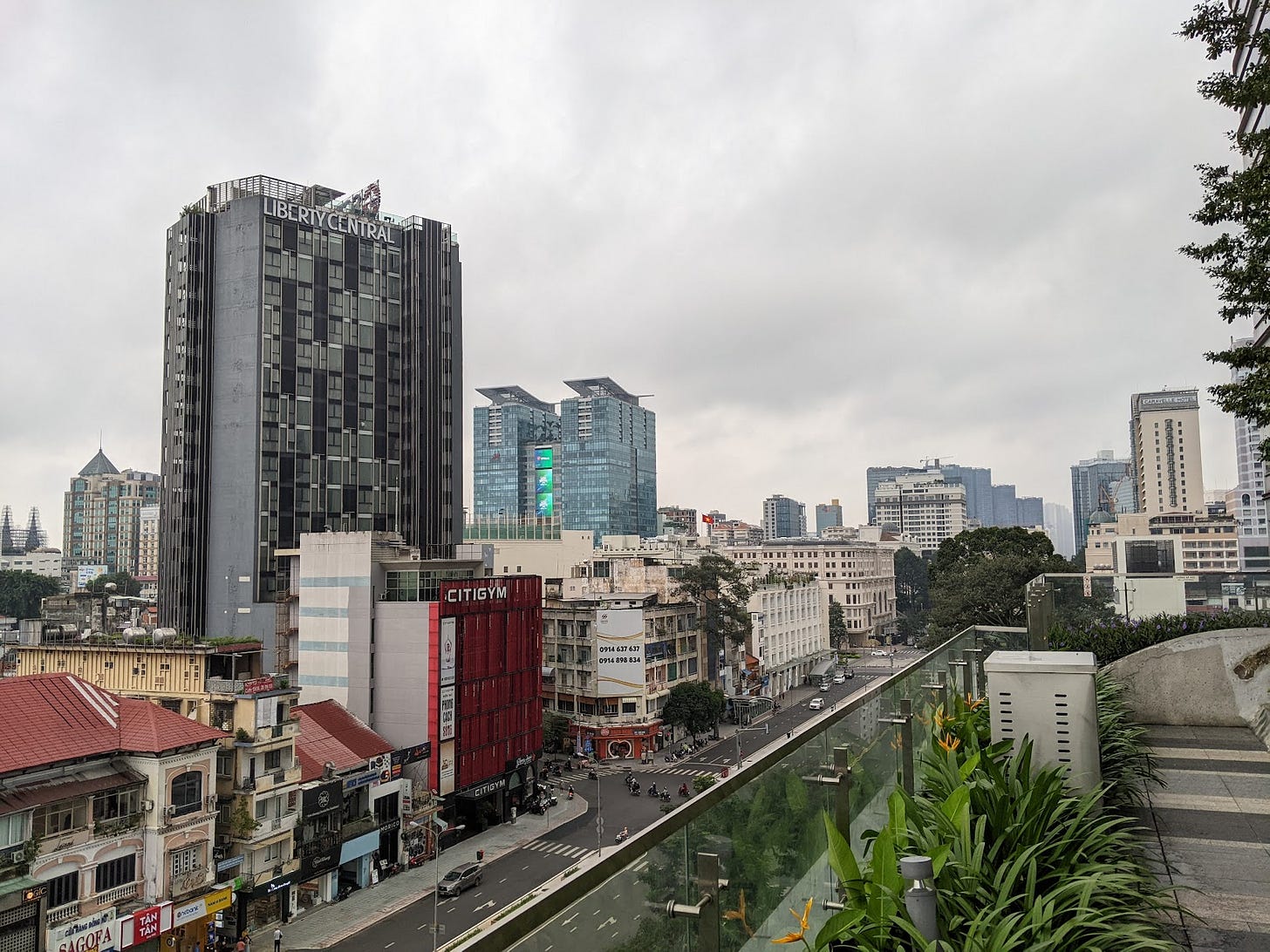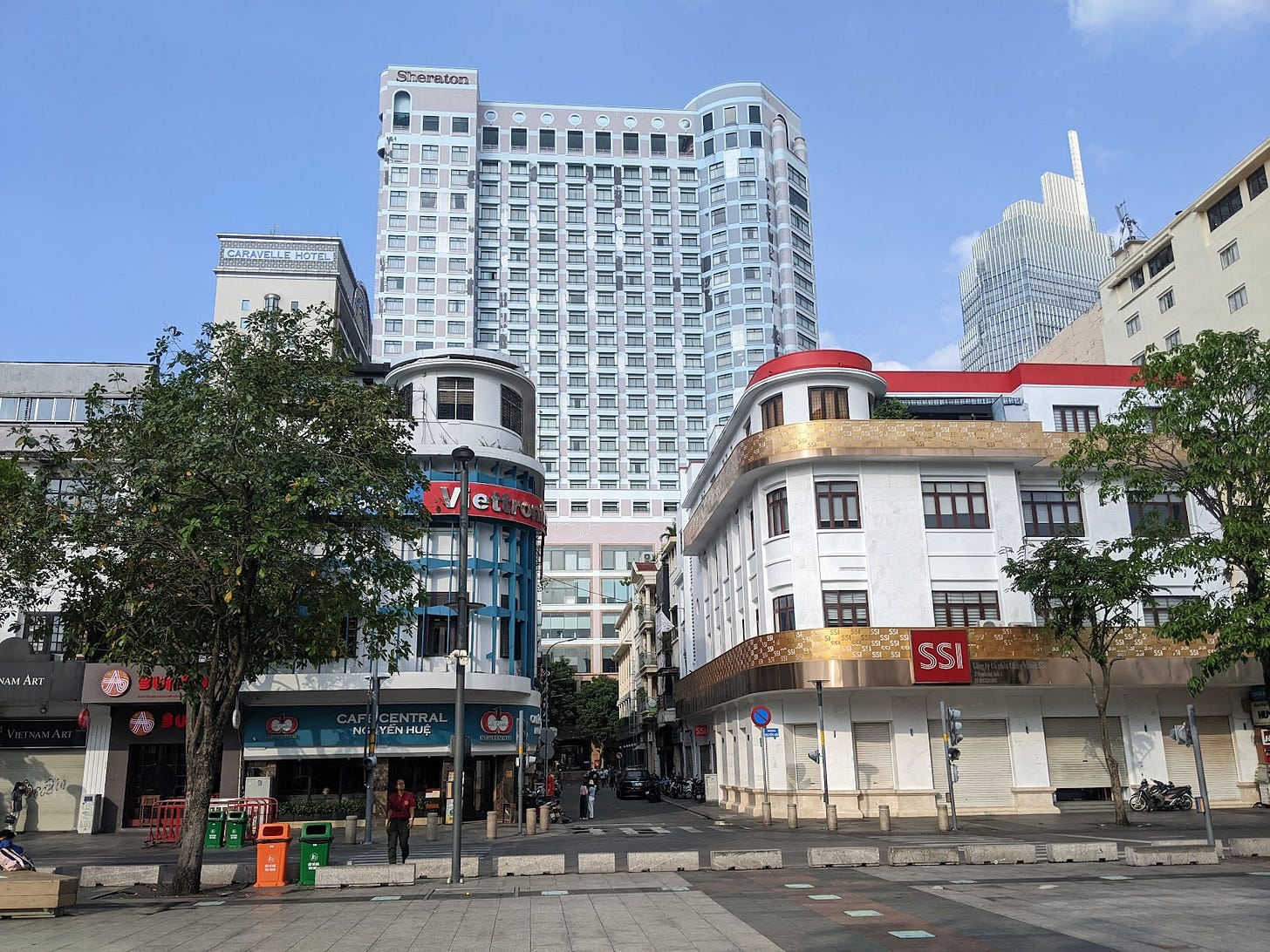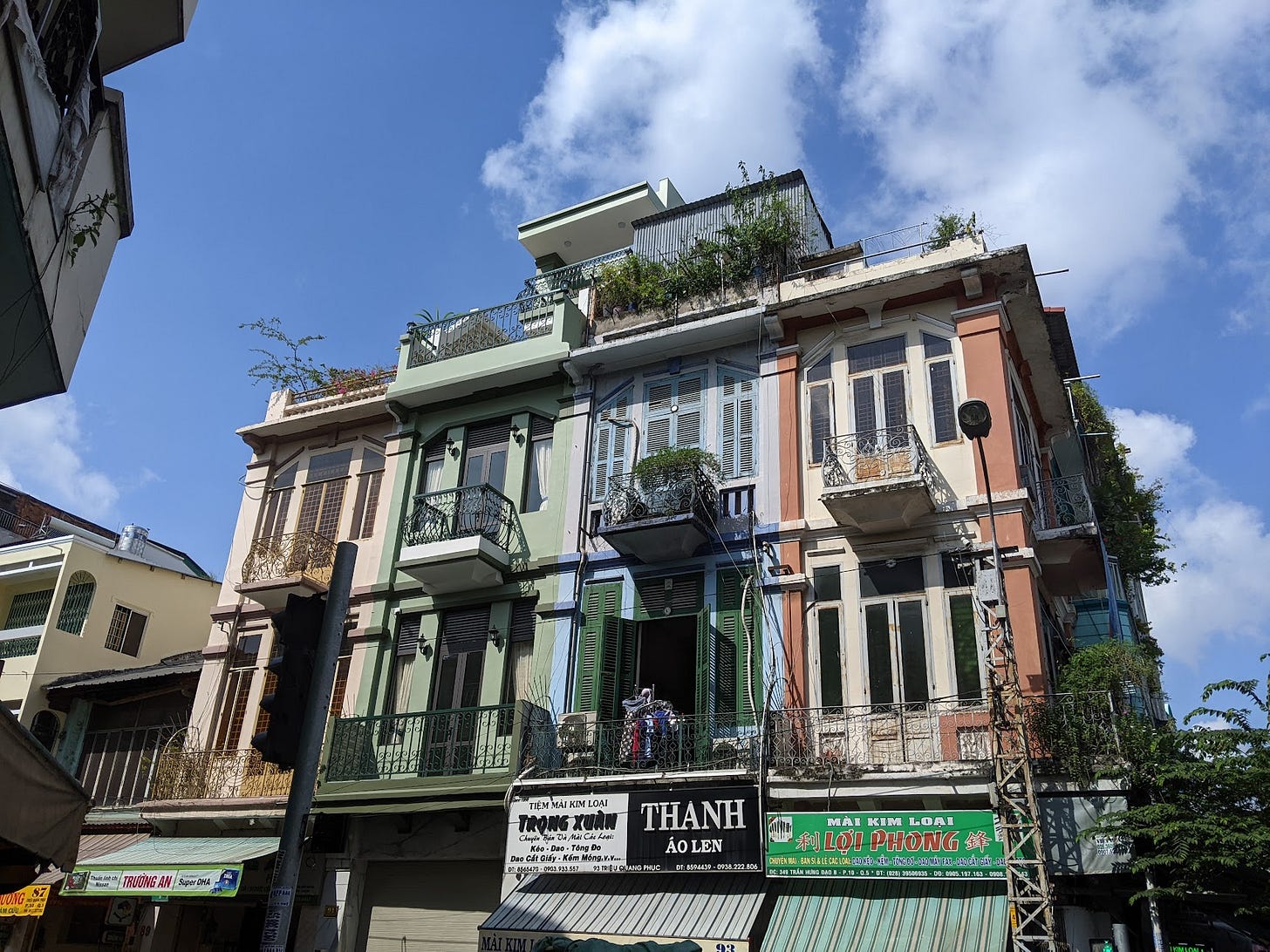Why Vietnamese Studies? Why here? Why now?
Twice a week, I cycle with a group here. I was talking to one of the women about what I was doing in Vietnam, and when I told her I was studying Vietnamese Studies, she asked the typical questions about why and how long I’ve been here and all that. These are perfectly reasonable, but I still struggle sometimes to put into words (succinctly) why I’m doing an MA here. This essay clocks in at over 3000 words. The answer isn’t succinct. Sorry not sorry.
A few minutes after our discussion, this white truck sped past our cycling group. In the truck bed was a silver contraption with a huge cross and spinning cylinders at all four corners. It shined in the morning sun. “What the fuck is that?” I said to myself, and then I turned to the woman who had just asked me about what I’m doing here and said, “That. That is why I’m studying Vietnamese Studies.”
It’s obviously more complicated than some Christian truck at 6:00am on a busy road in Ho Chi Minh City, but that experience of wonder and delight and curiosity and frankly being really perplexed does kind of answer this question of “Why Vietnamese Studies?” I find so many things here fascinating, and I have regular moments of “I want to know anything and everything there is to know about this place in this time.”
So, that’s one answer, and it is a big part of the “Why” I’m doing this degree. There’s a lot more, and I want to use this space and time to think about what I’m doing here. I was working on a different essay this week on the fundamental logic of the city, but I’m going to push that one off. I had multiple moments last week in class where I had the thought, “What even am I doing right now?” This essay feels more pressing.
Some words I wrote back in 2020
I thought an interesting place to start would be from an essay I wrote for my now defunct website answering the question “Why Vietnam?” At that point I had lived here six months, and I wanted to look at what I was doing in Vietnam and why. Here’s what I wrote –
“[Senior] year I was stuck applying to graduate school, writing a senior thesis, and trying to figure out what to do with my life. Since before I started undergrad, I assumed my path would be high school-undergrad-grad school, no gaps in between. That was the model my dad followed, my mom, my sister, my brother. I applied to graduate schools, but as senior year dragged on, I realized I didn’t want to do more school, at least not so soon. My senior thesis was dragging out, and I was starting to resent academia and lose interest in learning.
I thought about applying to programs like Fulbright or Peace Corps, but there was no guarantee of getting in. Programs can also be strict. I have done so many programs with so many rules now that I was ready to take control of my own life. I left university with the sense that I didn’t need programs to learn what I wanted. I left with this belief that, with the right environment, I could take control of my learning journey.”
I remember how much angst I felt about doing more school back in 2019 when I was graduating. I come from a highly educated family. It’s never been explicitly said, but I think my parents expect all of us to get PhDs. I was so burnt out from undergrad that I couldn’t even think about more school. I got accepted to a pretty prestigious university in California with a nice little tree on their logo, looked at the tuition cost, and went “fuck this.” I’m glad I didn’t pay $90,000 a year to get that MA in Chinese.
I moved to Vietnam back then because I wanted to learn a new language, and I wanted to do learning on my terms. I taught English but just as a way to make money. I spent my free time studying, going to language exchanges, and just trying to figure out how to learn Vietnamese.
After a 3-year break from higher education, I am ready and excited to be learning in the context of a program again. I have learned Vietnamese well enough to do the program, and I do have an okay knowledge of the country, but I’m to the point where I don’t think I can learn on my own anymore.
On Learning about a Place
I’ve felt for a long time that I have a capacity to love many different types of places in the world. I am a curious person, and I love to learn. I truly think there are so many places in the world I could live and feel fulfilled. I would like to live in Vietnam for a while, but I don’t know how long I’ll be here. A skill I desperately want is to learn how to learn about a place.
In some ways, I have figured this out somewhat by experience. I read novels based in cities I travel to in order to get a sense of place. I pay attention to how people describe their own city. Are people organizing their city with cardinal directions? Street names? Intersections? Landmarks? I consume a lot of content about the places I live, and I try to find communities I can join and participate in.
I do have experiential knowledge on learning about place, but I also am looking for something more systematic, something more scientific. Through doing this program, I’m hoping to gain a thorough knowledge on Vietnam, but I’m also hoping to gain some skills that, moving forward, I can use to learn about places in Vietnam and around the world.
Interestingly enough, a side effect of this I didn’t predict is that I’m gaining new comfort in writing about Vietnam. I have done a few freelance pieces about the city, mainly for Saigoneer, who I’m grateful have been so open to different things I pitch. But I’ve been really hesitant to write about anything too far from my own lived experience. That’s led to some pieces I’m really proud of about Chinese food in the city, but I also see so much stuff here that I think would make for good articles.
This program is helping me bridge this gap I didn’t even realize I had between memoir and journalism. I’ve always felt comfortable writing about myself, but now I’m slowly starting to gain some comfort to write some stories that don’t have me. I’m going to tread carefully moving forward, but it’s exciting to think I’m gaining skills to write too.
My purest goal
Part of the reason why I’m doing this specific program is because I want to learn about Vietnam in Vietnamese from Vietnamese people. This is admittedly meta, but I see every experience in this program as an experience in Vietnamese society. And because I value experiential learning so much, there’s a lot for me to gain just from being a participant in an MA program in Vietnam. I will admit, I’m doubting this choice a bit, because I am still struggling with the teaching style here. A few weeks ago, I wrote about how Western I feel in an academic context, and that feeling hasn’t really gone away.
That being said, my purest goal with doing this degree here is to get good at Vietnamese. I should also define a bit what I mean by “good” at Vietnamese. For my own personal use, I am most interested in reading academic articles and novels in other languages. Speaking with people is important, but it’s actually secondary for my own interests. I want to emphasize how this is a pretty narrow use of language, and it is dismissive of languages without written tradition. Those are valuable and important, too, but outside of my own interest at this time.
By doing this program, I hope to attain proficiency in academic Vietnamese and be able to read most modern texts without the need of constantly referencing a dictionary. I keep reminding myself that when I think classes are boring. I remind myself that, at the very least, I’m getting 2+ hours of Vietnamese language input six days a week.
Depth and Breadth and Breathe
One of the great questions of my life is how can I manage to achieve both breadth and depth of learning. When I’m really passionate about something, like an author, I don’t just want to learn a bit about them. I want to read everything they’ve written. I want to read biographies and book reviews. I want real depth of experience. The problem is that I like so many things, and want to learn so many things. I need some constraints on my studies, some framework.
That’s what this degree is for me. I get a real wide swath of knowledge (history, literature, linguistics, government, economics, etc.) all focused on one area (Vietnam). There is both breadth and depth in this mode of study, and I can’t imagine any other field more attractive to me for the nature of learning I want to achieve.
There’s this place I look for in life – where life and learning intersect. Learning a language in-country is a great example of this spot. You sit in class and immediately get to walk out and use the language. That’s a big part of the reason I majored in Mandarin and studied abroad so much. I wrote some of my initial feelings around this back in 2016, and rereading that essay now, the sentiment still stands. When there’s this resonance in my life at the intersection of life and learning, I feel a high, this tingling in my head, an excitement.
For me, though, there’s a real danger in all of this for my mental health. I can only sustain that mental state for so long, and if I’m not careful, the resonance can build up so much that I become consumed.
After I read Mel Schenck’s book Southern Vietnamese Modernist Architecture last year, I went through this period of wonder walking around the city, identifying washed stone and brise-soleil, guessing time periods buildings were built, marveling at the influence of modernism on contemporary vernacular architecture in the city.
That wonder quickly turned sour. I couldn’t turn my brain off. It’s cute for a week to have this perspective on the city, but after a while it’s exhausting. Sometimes I want to walk around and just be in my body, not off in some mental space seeped in book learning.
My default is to intellectualize everything. Every interaction is an essay idea. Every observation gets filed away as future thesis topics. It’s overwhelming, and if I want to both live here and research this place, I have to figure out some way to separate “life” (being in my body) and “work” (being in my head).
I like that Vietnamese Studies gives me breadth and depth, but sometimes it’s too deep. I have to remind myself to breathe.
Cost of living + cost of education + legally being in Vietnam
Cost of living and cost of education is also a huge reason I’m here. I feel like this is an unspoken but common reason a lot of Westerners are here. Or if it is spoken about, people aren’t going into the details about it publicly. Especially Americans. Americans in general are so uncomfortable talking about money, and I did go through a weird period here where I didn’t talk about it because I felt shitty knowing how much I was making compared to local people. Every time I told local people my rent, the reaction was shock. “Too expensive.” or “You could live for cheaper.” I started lying about my rent, but I’m over that too. How are people going to know the realities of the lives of certain groups here if we don’t talk openly about money? So here are some details about my spending. The VND-USD (24,854.97 VND = 1.00 USD) conversion is from today. The dollar is going far here right now. Normally the conversion is somehwere around 22,000 VND = 1.00 USD.
I pay 10,000,000 VND (~402 USD) a month for rent. This does not include water or electricity. I live alone and only turn on my AC to sleep, so my utilities are pretty cheap. I am admittedly paying more than I have to for rent because I want to live alone and have a good kitchen. I could live somewhere smaller for 8,000,000 VND (312.00 USD) or have roommates for around 5,000,000 VND (201.17 USD). These are the rates for my neighborhood, which is gentrifying and in walking distance to the city center. From an American perspective, my rent is cheap. When I was teaching, my rent was a little less than 1/4 of my income.
I eat cheap most meals. My favorite chicken place that I visit multiple times a week is 35,000 VND (1.41 USD). My favorite bánh mì place is 20,000 VND (.80 USD) per bánh mì. I normally eat two, but if I’ve just finished swimming I eat three. When I do occasionally eat out somewhere more expensive, I rarely am paying over 250,000 VND (10.00 USD). I very rarely drink. I shop at the local market, small grocery stores, and occasionally at international grocery stories when I need things like vanilla extract.
I brought a lot of clothing over from the US. I do like to shop for clothing, but I usually buy second-hand here. If you go to a really nice second-hand shop, you might spend 690,000 VND (27.76 USD) for a really nice piece (I know this price because I have a shirt in mind I want to buy). At the mid-level places I shop, I’m usually paying around 100,000 VND (4.02 USD) or 200,000 VND (8.04 USD) per shirt.
I cycle when I can. I take the bus as much as possible. Bus tickets are around 6000 VND/ride (0.24 USD/ride). I walk a lot. I sometimes take Grab to class, but it’s only 14,000 VND per way (0.56 USD). Since I have class six nights a week, I rarely leave my neighborhood or the area around school, so my transportation cost is really low right now. I also don’t really like to travel that much and spend holidays in the city.
My computer works. My phone is fine. I haven’t bought anything on Shopee or Lazada in months. I have a penchant for stationary, which is cheap where I buy it.
My tuition as it stands now is 16,000,000 VND (643.37 USD) for one semester.
This is going to get slightly adjusted depending on how many classes I register for. My parents are paying my tuition, which is incredibly generous of them, and I’m grateful for it because it means I don’t have to work much and can really focus on school. My health insurance, which is the most basic plan available through Bao Viet is 12,000,000 VND (482.80 USD) for the year. My parents are paying for that as well.
All this is to say, coming as someone who worked some in the US before moving here and then worked here as well at a job that paid well, I am in a very comfortable position financially. The assistance of my parents as well means I don’t have to worry that much about money. I’m still pretty frugal, but that’s more out of habit than from any actual financial worries. The fact that I’m interested in Vietnam is amazing. The fact that money is barely a concern for me here makes it a very appealing place. It would be irresponsible not to talk about that. I have time and money for school, hobbies, a social life, and regular exercise. Money is a factor, and not a small one, for why I’m still here and why I’m interested in staying longer if I can.
In regards to the question of “staying here,” there’s also a real attraction to having a visa attached to a university. When I had a temporary residence card (TRC) tied to a job, there was always this anxiety about getting fired or wanting to quit and not being able to leave. Being on a student visa lets me be here legally and for the duration of my studies. It’s not stable long term but it’s the most stable I’ve felt here since moving, and that’s a great feeling.
Vietnam feels like Mississippi and Mississippi feels like Vietnam
Vietnam as a place also feels at this intersection of my lived experience. I grew up on the Mississippi Gulf Coast, which has a sizeable Vietnamese population. We used to eat a lot of Vietnamese food growing up, mainly at places in Slidell and Biloxi. I also went to New Orleans a lot as a kid, a city with a huge French influence. There are corners in this city, especially in District 5, where I stand in marvel and think, “This looks just like New Orleans.”
When I’ve gone back to visit home, we’ve also spent more time in the Vietnamese parts of Biloxi and New Orleans. With more context from my life in Vietnam, I feel I have an even better understanding of the areas surrounding where I grew up. There’s this connection between the Gulf Coast and Vietnam with food, and history, and people.
There’s also a shared vocabulary in the climate and landscape of southern Vietnam and Mississippi that entrances me. I’ve been to places in the Mekong Delta that look just like a Mississippi swamp. The clumps of water hyacinth floating down the Saigon River bloom the same purple as the ones in the lake behind my parent’s home in Mississippi. The angel trumpets in front of my apartment are made of the same silky fibers as the ones my mom grows. Every day I walk past spider lilies, Mexican petunias, lantana, and crepe myrtles. Some nights, the sky lights up with heat lighting, just like summers at home. There are times when Vietnam feels like Mississippi and Mississippi feels like Vietnam.
Then there are the things that remind me of my life after high school. The temples in District 5 transport me back to Kaohsiung. The ethnically Chinese food in the city brings me to trips to Hong Kong and Guangdong and Fujian. In classes, we talk about the influence of China on Vietnam so much. Living here, I get to engage with my own past and present. It’s at this seemingly impossible confluence of my childhood in Mississippi and my life after high school learning about Taiwan and China. It makes Vietnam so precious to me.
There’s more. I’m certain of it. More reasons. More anecdotes. Always more. But I’ll stop here, for now. Partly because I’m tired and partly because I have to decide where to stop at some point, and this place feels right.






